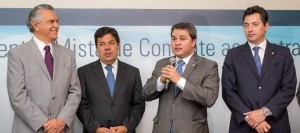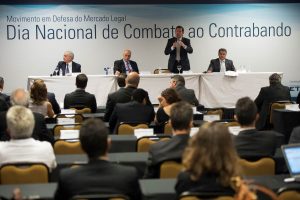Article Deputy Efraim Filho
In these times of crisis in which the country is investigating Petrolão, one of the biggest corruption scandals in our history with an estimated value of R $ 80 billion in deviations, there are equally scandalous numbers that are going unnoticed by many people.
Brazil loses, annually, R $ 100 billion with the crime of smuggling. It's a lot of money. It is a resource that could be used in needy sectors such as health, security, infrastructure and education, for example.
Therefore, the government needs to take decisive, effective and immediate measures in the face of this serious problem that has been occurring with impunity in the country and without the attention that the topic deserves.
We must understand that smuggling is a crime and directly involves or is part of the corruption process that is plaguing Brazil. To attack smuggling is to put an end to institutionalized corruption.
Moreover, today Brazil needs resources for the growth of the economy and investing in the fight against smuggling is an efficient and low cost way to increase tax collection. There are two ways for a government to collect more taxes: increase the rate of products or increase the tax base. What has been happening is the increase in tax rates, which is leading the low-income population to consume contraband products, cheaper for not paying taxes and without any quality control. In other words, the high tax reduces the collection and increases the risk to health.
Combating smuggling is, therefore, a life-saving measure. After all, the health of all of us is impaired when we consume products such as medicines, drinks, cigarettes, toys or glasses that freely enter the country without certification. A child may be suffocated with an unsecured toy or even lose his life when taking a counterfeit medicine. A study carried out by the State University of Ponta Grossa (UEPG) with samples of Paraguayan cigarettes found even the presence of residues of cockroaches and rats.
Cigarette leads the ranking of smuggled products in Brazil (31,5% of the market), which caused, last year alone, a loss of R $ 4,5 billion due to tax evasion. Not to mention the loss of jobs.
Smuggling is also an activity that finances trafficking in arms, drugs and organized crime, affecting the safety of our families.
An extremely important measure is to strictly punish these crimes, and that is why I was the author of the bill that increased the penalty for the crime of smuggling and differentiates it from misdemeanor.
To curb these serious misconduct that continue to punish society and hamper the investment capacity of Brazilian companies, the Mixed Parliamentary Front to Combat Smuggling and Counterfeiting was created, formed by more than 200 participants, including federal deputies and senators, with the objective of the definition of effective proposals in the legislative field and the collection of the Executive Power in the execution of firmer and more immediate actions.
Smuggling is a world where few win, but everyone loses. And more than ever, coordinated action by the public authorities, society and the productive sector is necessary in a collective exercise of responsibility to combat these criminal activities that negatively impact the Brazilian people and national sovereignty.






